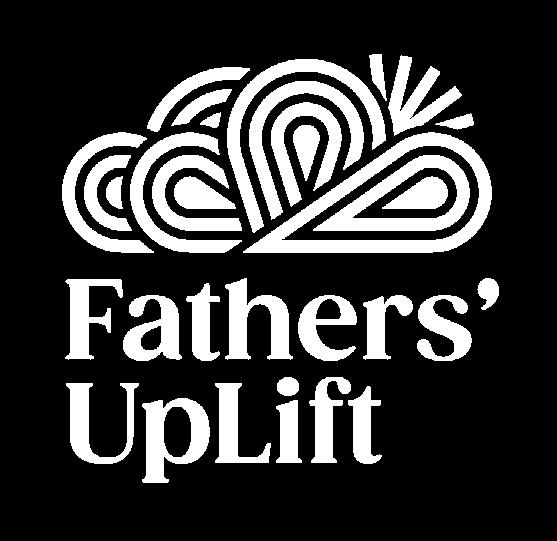

YOUTH ENRICHMENT







In 2011, I began a project as part of my participation in the Albert Schweitzer Fellowship. My goal was to serve an underserved community that I was passionate about. I called my project Fathers’ UpLift. It was to be a fathers’ support group that addressed participants’ concerns about poverty, lack of resources, and needs for support. Little did I know, that project would seize control of my heart and activate a lifelong passion within me. That project was the very first beginning of what is now Fathers’ UpLift, the nonprofit.
Since 2011, we’ve served nearly 15,000 fathers and family members through direct service therapy and coaching supports, reached an estimated 100,000+ through trainings provided to mental health and social work professionals serving our Black and Brown communities, and have even seen our interventions applied in Benin in West Africa, where Fathers’ UpLift Affiliate, The Batonga Foundation, provided two of our interventions (translated into French) for men in their community. That fellowship project sure has come a long way.
On a more personal note, we are thrilled to announce the upcoming release of my book, “PRESENT,” co-authored by Samantha, under the prestigious Convergent Books imprint of Penguin Random House. Scheduled for publication on June 3, 2025, “PRESENT” offers a nonfiction narrative that delves into the social complexities faced by Black and Brown fathers as they strive to reconnect with their children and embrace the transformative power of present fatherhood for their families and society at large. The book includes personal stories, practical advice, and insights from our work at Fathers’ UpLift, making it a comprehensive guide for anyone interested in fatherhood and family dynamics.
This milestone would not have been achievable without your enduring support and belief in our mission.
I contributed to Fathers’ UpLift part-time alongside Charles from the beginning. I always saw there was something significant here. There were hard times. Early on, Charles even offered to throw in the towel for the sake of our family’s provision and wellbeing, but I knew we could never let that happen. This mission was too important. In 2016, I left my job as a clinician with Smart from The Start to join Charles full-time with Fathers’ UpLift, serving as a hands-on Chief Operating Officer who was also providing clinical therapy services and managing the books.
Back then, we had our hands in everything. We had to. Over the last several years, Charles and I have stepped into a more truly executive role in order to properly manage and guide this growing organization and movement. With a team of almost 50 individuals now (45 as of Q1 2024), there is far too much to manage for us to sit in therapy rooms with our clients and meet needs directly ourselves. Now, we are tasked with growing this vision, shifting from being a strictly Boston-operating mental health nonprofit to making a meaningful, national impact on this statistic: An estimated 5 million dads in the U.S. have not seen their kids in the last month.
This report shares a little bit of our first steps in getting there in 2023. We hope you’ll consider partnering with us in 2024 and beyond to make this vision a national resolution to a problem that truly is national in scope.


Dr. Charles Daniels and Samantha Fils-Daniels, Fathers’ UpLift Co-Founders
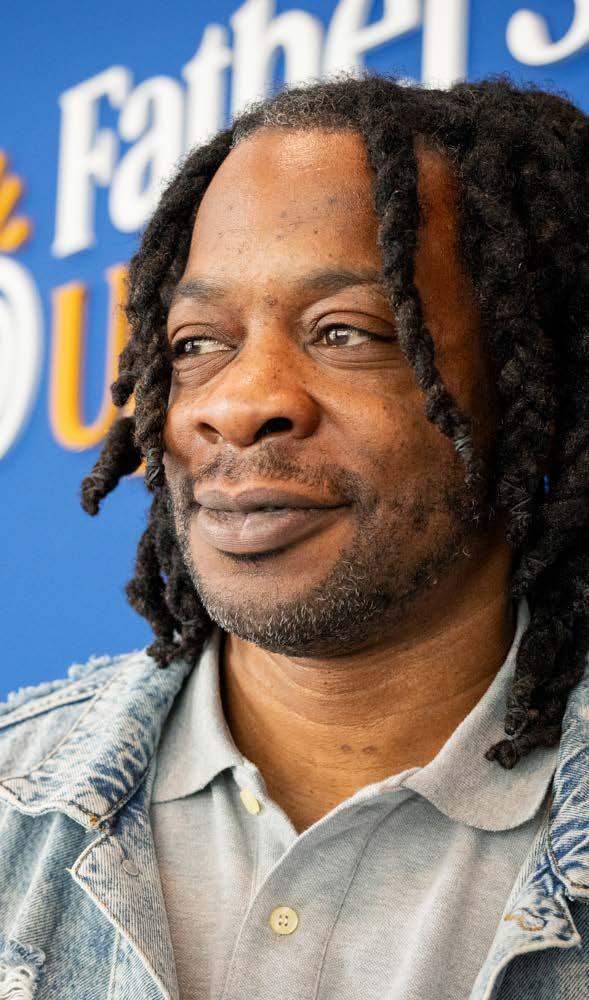
3,973 individual encounters 93% reported improved relationships with their children 86% reported improved quality of life
In 2023, we invested in the sustainability and efficiency of our flagship Boston locations. We hired three managers, two program coordinators, two administrative staff, and four coaches to ensure this location is well-equipped to serve fathers and families for years to come.
I feel that there [is] a great group of sincere and genuine individuals that care deeply [about] what you do in life. Fathers’ UpLift is a beautiful part of that.
—anonymous client
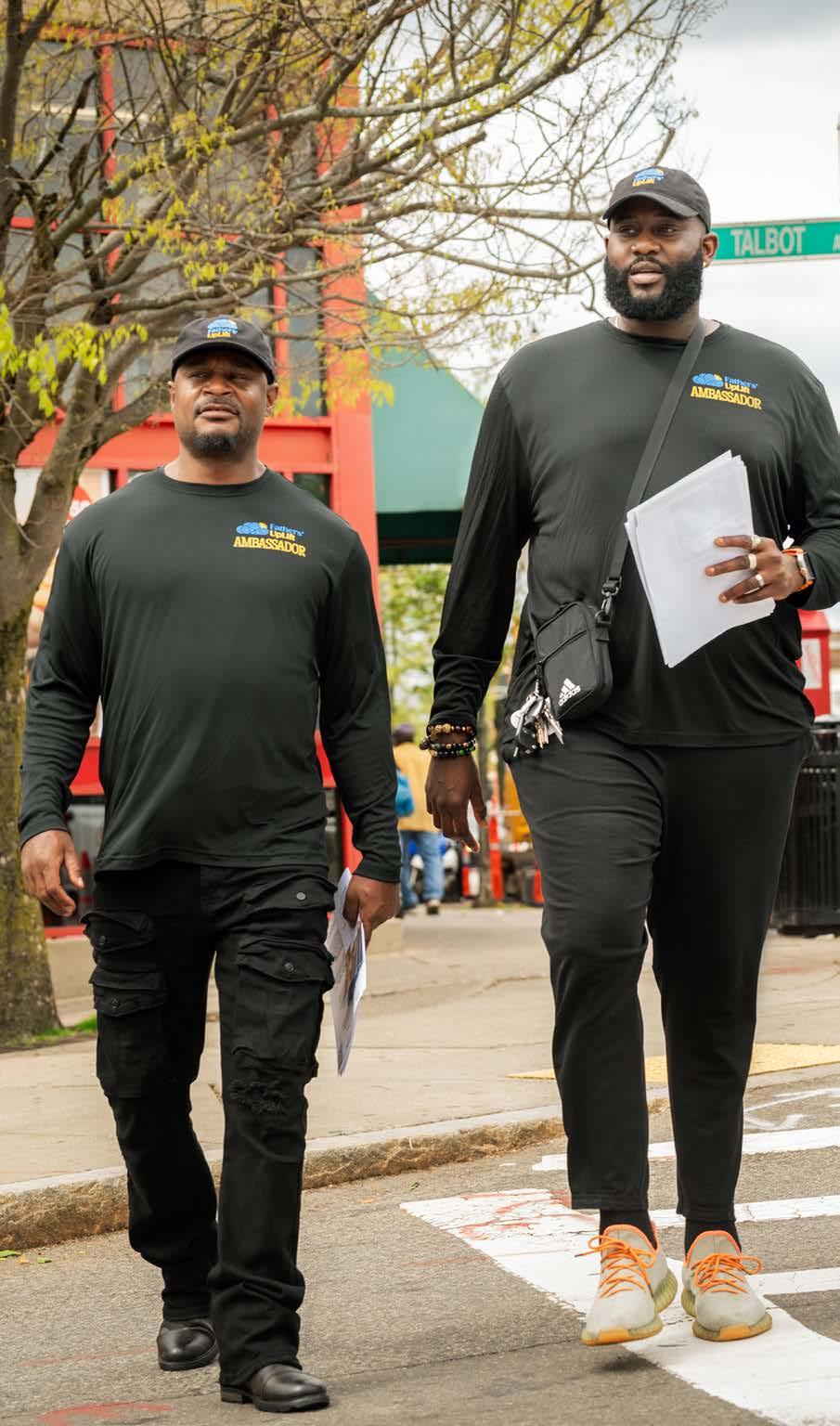
At Fathers’ UpLift, our commitment to creating systemic change includes and extends beyond immediate interventions. We aim to foster long-term societal shifts that address disparities in mental health access and reduce the cycle of father absence, particularly within BIPOC communities.
A pivotal element of our systemic impact is through the United States Therapist Recruitment (USTR) Fellowship, which equips social workers with specialized training to support BIPOC individuals and those facing significant internal and external challenges. By introducing more culturally competent professionals into the mental health field, we are directly addressing the shortage of therapists who understand and reflect the communities they serve. This initiative not only increases the availability of qualified therapists but also ensures that these professionals are prepared to navigate the complexities specific to these populations.
Another significant systemic change we are spearheading is the reduction of stigma towards mental health services among men of color. Historically, BIPOC men have utilized mental health services at around half the rate of their white counterparts. This is often due to stigma and a lack of culturally responsive care. Fathers’ UpLift confronts this challenge head-on by promoting mental health awareness, providing accessible, culturally relevant services, and modeling positive mental health practices through our community-based programs. Our approach helps normalize seeking help and builds trust in mental health systems, paving the way for more men of color to embrace these essential services without fear of judgment.
Lastly, our unique blend of services — including therapy, coaching, and community engagement — targets the roots of father absence and its generational impact. By supporting fathers in becoming present and positively engaged in their children’s lives, we contribute to healthier and happier childhoods, laying the groundwork for these children to lead fulfilling lives. This not only disrupts the cycle of fatherlessness but also cultivates a foundation for enduring family relationships and community stability. Through these strategic initiatives, Fathers’ UpLift is not just changing lives in the present; we are reshaping the societal landscape to foster mental health access for all, diminish stigma, and promote familial health for generations to come. Our work today is sowing seeds for a future where every individual and family can thrive in a supportive and understanding environment.
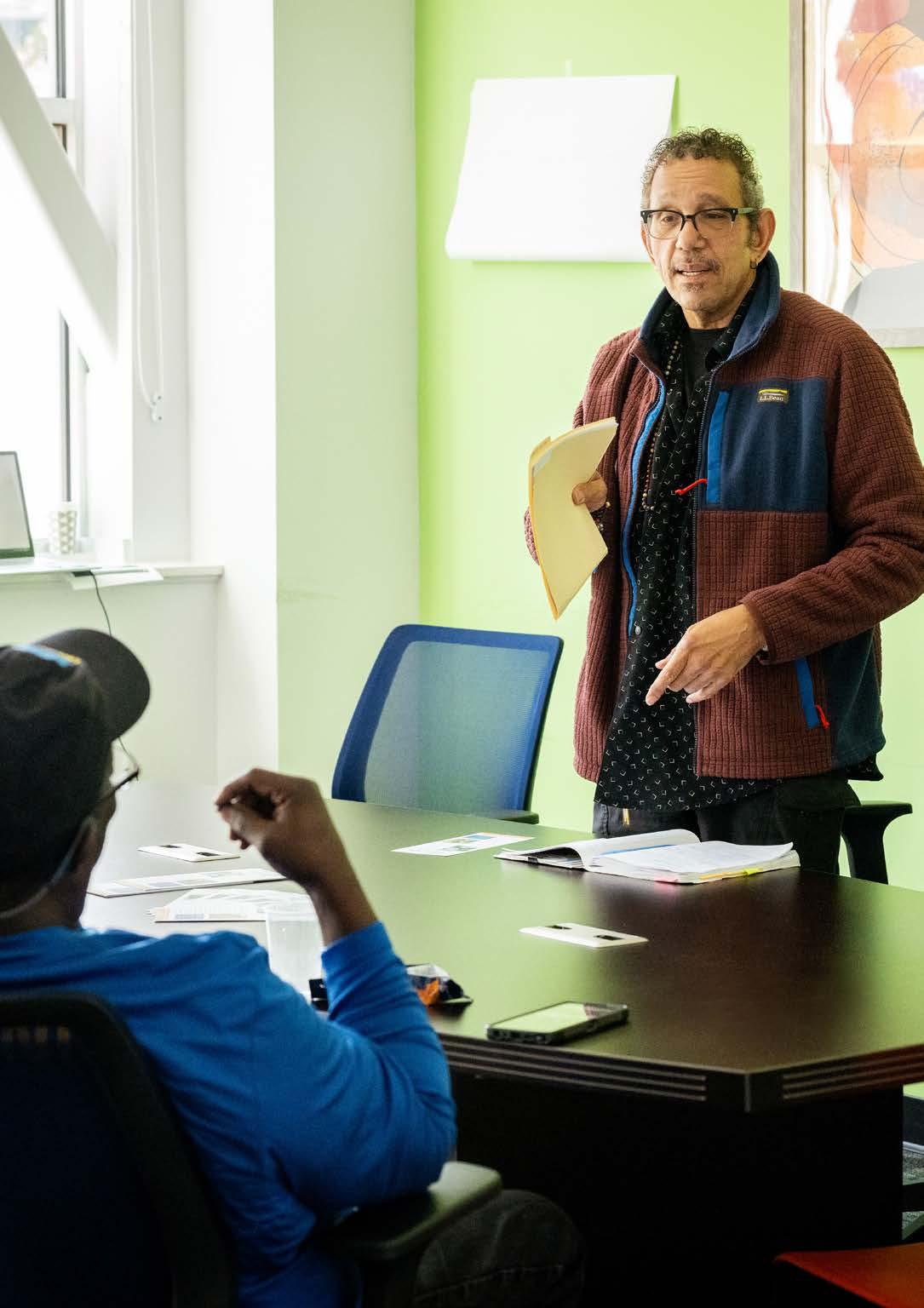
2023 was a year of both deepening our roots and growing our branches. As our growing pains from the exponential growth of the early 2020s slowed, we hit our stride. Middle management helped to significantly improve our organizational efficiency as well as drastically reduce staff turnover. This allowed us to serve 426 individuals with direct therapy and/or coaching services.
At the same time, our Affiliate and USTR Fellowship programs took off with vigor. We provided training and resources for 18+ organizations, clinics, and nonprofits across the U.S. and beyond, several of whom became Affiliate Partner Sites, utilizing our evidence-based interventions and curricula. Similarly, we trained and worked with 12 Fellows – stipended graduate-level behavioral health workers of color – to work toward increasing the proportion of BIPOC clinicians in the U.S. These Affiliates and Fellows are now equipped to serve clients, particularly men of color, with a culturally- and racially-sensitive and trauma-informed approach.
We optimistically look toward the remainder of 2024 and the rest of this decade with hope that thousands more men will overcome barriers, thousands more children will have a present father in their lives, and hundreds more organizations and clinicians will utilize our effective approach to serving fathers and their families.
18+ trained organizations, clinics, and nonprofits
12 Fellows trained, increasing the proportion of BIPOC clinicians in the U.S.
DR. OWENS
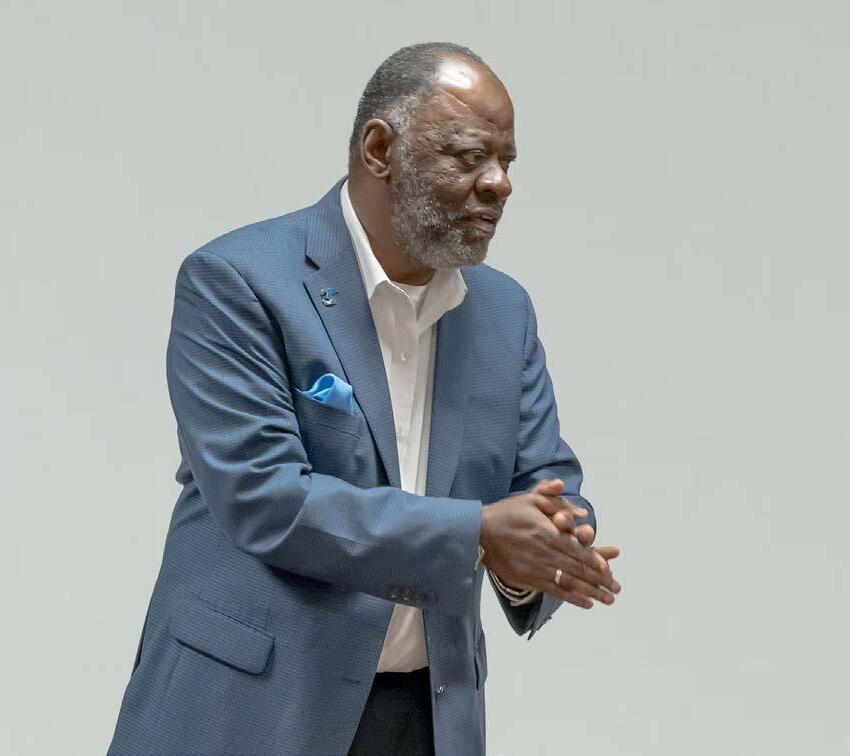
Dr. Owens and Dr. Daniels shared a bond that transcended time and space, a connection forged in the halls of BethuneCookman University. It was there that Charles, now known as Dr. Daniels, first encountered Dr. Anthony Owens, a beacon of guidance and wisdom in his time of need.
As an undergraduate student facing academic challenges and the looming threat of dropping out, Dr. Daniels found solace in Dr. Owens’s words. The seasoned educator constantly reminded him not to let his past circumstances dictate his future, to rise above his struggles, and to carve out a path of success for himself.
Owens became more than just a mentor to Dr. Daniels; he became a father figure, a role model, and a source of unwavering support. Through his encouragement and mentorship, Dr. Daniels discovered a newfound resilience and determination to overcome his obstacles.
In 2009, Dr. Daniels proudly graduated with a Bachelor’s degree in Political Science, a feat he attributes to the profound impact of Dr. Owens’s words and guidance. Reflecting on his journey, Dr. Daniels acknowledges Dr. Owens’s pivotal role in his transformation, stating, “I did not know it was possible not to allow your past circumstances to control you until Dr. Owens told me I could overcome them… Not only did he tell me once, but he also continues to speak life into me.”
I did not know it was possible not to allow your past circumstances to control you until Dr. Owens told me I could overcome them… Not only did he tell me once, but he also continues to speak life into me.
— Dr. Daniels
Fast forward to the present day, and Dr. Owens has taken on a new role as a member of the Affiliate and Educational Opportunities Department at Fathers’ UpLift. In this capacity, he oversees the success of future therapists in the United States Therapist Recruitment Fellowship program, much like Dr. Daniels.
Together, Dr. Owens and Dr. Daniels collaborate to uplift and empower students, drawing from their shared experiences and the profound lessons learned along their respective journeys. With his love and expertise on our team, Dr. Owens is a guiding light for students like Dr. Daniels, offering them the same unwavering support and mentorship that once fueled his success.
In education and mentorship, Dr. Owens is not just a resource or guide; he is a living example of resilience, compassion, and dedication. Dr. Daniels, now a thriving professional in his own right, recognizes the invaluable gift of having Dr. Owens by his side, a constant source of inspiration and encouragement.
As Dr. Daniels charts his course in therapy, he carries with him the words and teachings of Dr. Owens, a testament to the enduring impact of a mentor who believed in his potential and nurtured his growth. In Dr. Owens, Dr. Daniels found not only a mentor but a lifelong companion on the journey to success.
In late 2022, Fathers’ UpLift launched the United States Therapist Recruitment (USTR) Fellowship with funding from Massachusetts’ Home and Community Based Services and Human Service Workforce Development Grant Program. This transformative initiative targets Black, Indigenous, and People of Color (BIPOC) at the master’s and doctoral levels in mental health disciplines, offering a $15,000 stipend, mentorship, licensure preparation, and clinical supervision.
The fellowship, overseen by Cori Williams, a LICSW at FUL, began by interviewing 24 candidates. The final cohort consisted of 12 fellows from diverse states, including Indiana and California. These fellows received over 150 hours of clinical supervision and 75 hours of mentorship from 11 licensed therapists across eight states. These mentors not only provided direct support but also contributed as speakers and panelists in weekly fellow activities, enhancing the educational experience.
We met challenges such as delays in obtaining paperwork and managing multi-state coordination with strategic adaptations. These included enhanced communication practices and a more flexible approach to address individual circumstances, ensuring smooth program execution and compliance with immigration and contractual requirements.
Key outcomes of the USTR Fellowship included successful completion by 12 fellows, robust support through mentorship, and impactful community engagement activities. These efforts underscored our commitment to increasing the representation of minority therapists in the mental health field, providing them with the tools necessary for effective practice and licensure achievement.
The program’s effectiveness was also highlighted by a financial contribution for fellow resources and a partnership with Foley & Hoag, LLP to develop robust legal frameworks for the fellowship operations. These achievements reflect Fathers’ UpLift’s dedication to fostering diversity, enhancing professional development, and ultimately enriching the therapeutic landscape.
See page 21 for more impact reporting on the fellowship’s success!
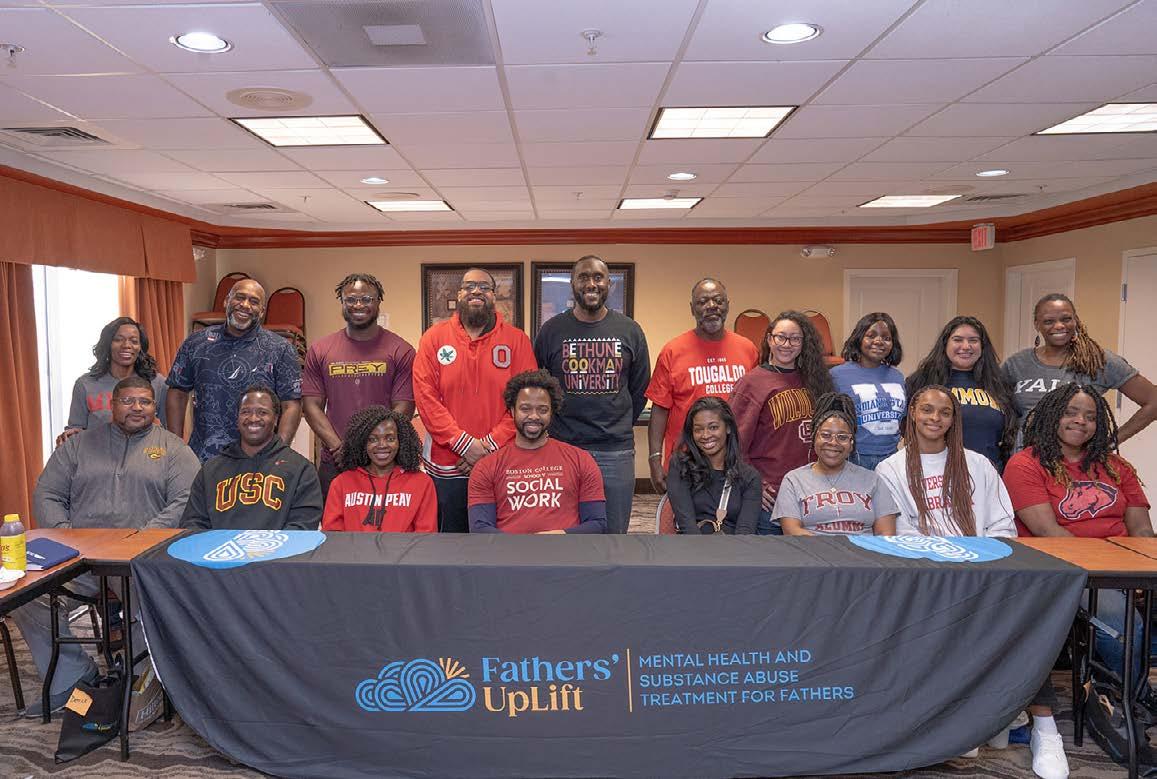
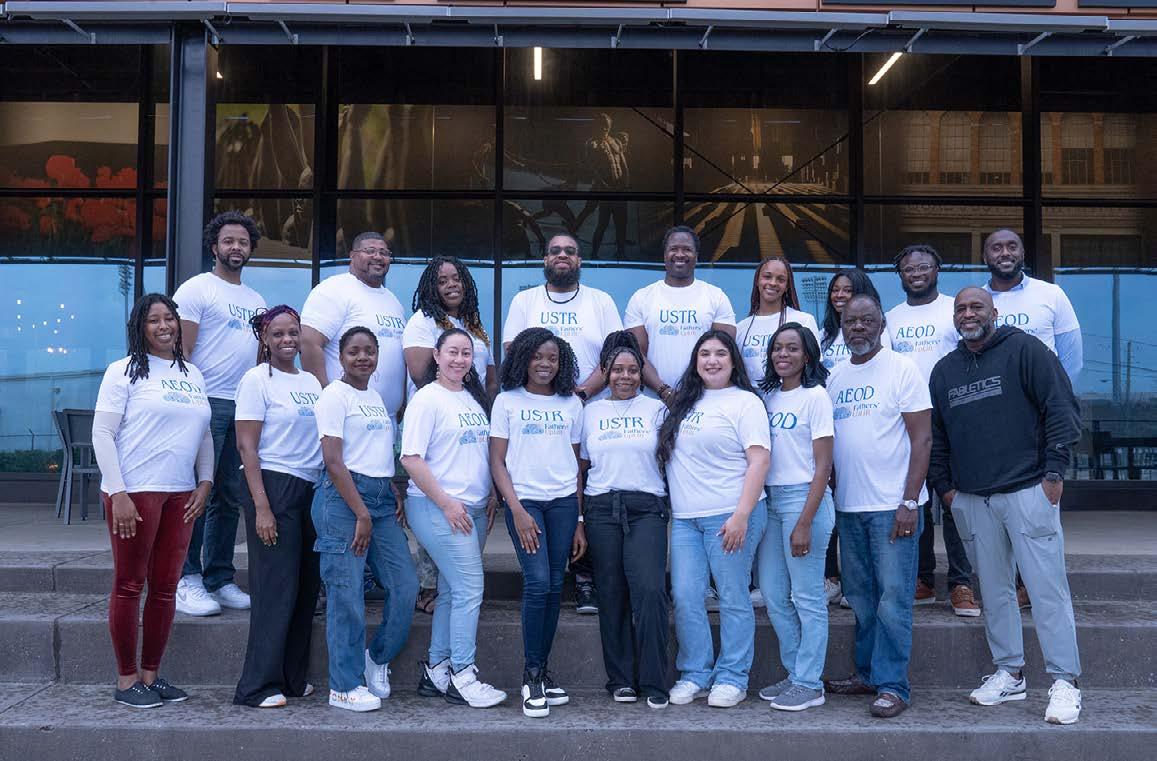
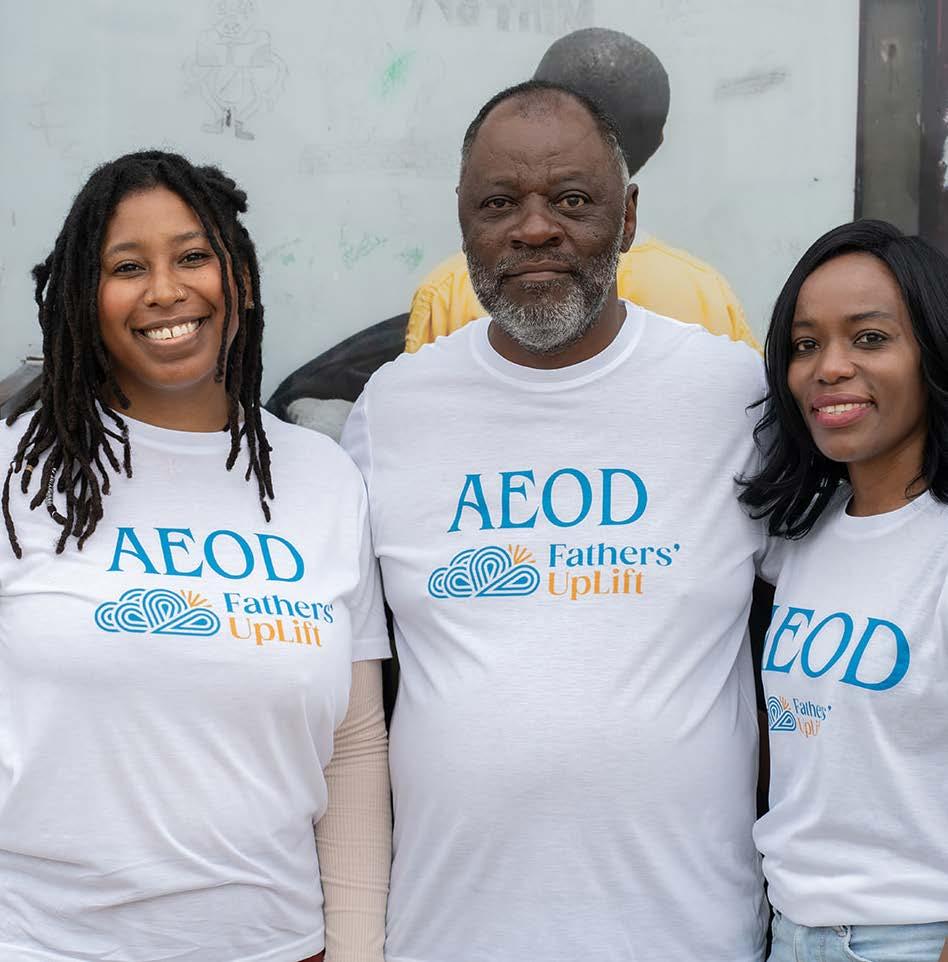
continued
In 2023, Fathers’ UpLift appointed Lillian Rice and Dr. Anthony Owens as AEOD Managers, with Dr. Charles Daniels supervising them. They spearheaded the implementation of programs across various locations, engaging over 18 organizations.
Key achievements included Fathers’ UpLift training three facilitators at Free Spirit Evangelistic Outreach and maintaining a year-long engagement with Bridges Homeward, which included a session in March 2024 led by a U.S.T.R. Fellow. The organization also planned a collaboration and retreat with The Friends of the Children.
Fathers’ UpLift successfully finalized contracts and completed affiliate engagements with partners such as Free Spirit, Bridges Homeward, Words of Wisdom, and the Batonga Foundation. The organization continued discussions with the University of Tennessee to develop a licensing prep curriculum for social work students.
Moreover, Fathers’ UpLift trained 43 individuals and provided $2000, in technical support to the Batonga Foundation for curriculum delivery. The organization also hosted a Community Network Meeting in partnership with Bethune-Cookman University in Daytona Beach, Florida, expanding community engagement and impact.
See page 21 for more impact reporting on the Affiliate program’s success success!
Black/ African American American Indian/ Alaska Native Asian Other/ Refused
We are privileged to directly serve an incredibly diverse client population in many of Boston’s neighborhoods.
* Note: 18% of clients identify as having Hispanic/Latino ethnicity, and these numbers do not add up to 100% because Hispanic/Latino ethnicity is surveyed separately from race
Our clients have faced numerous barriers and challenges, including the following:
have spent time in prison
18.2 - average age at first arrest
reported history of substance use
had a household member go to prison
persons with disabilities
refugees/immigrants LGBTQ+
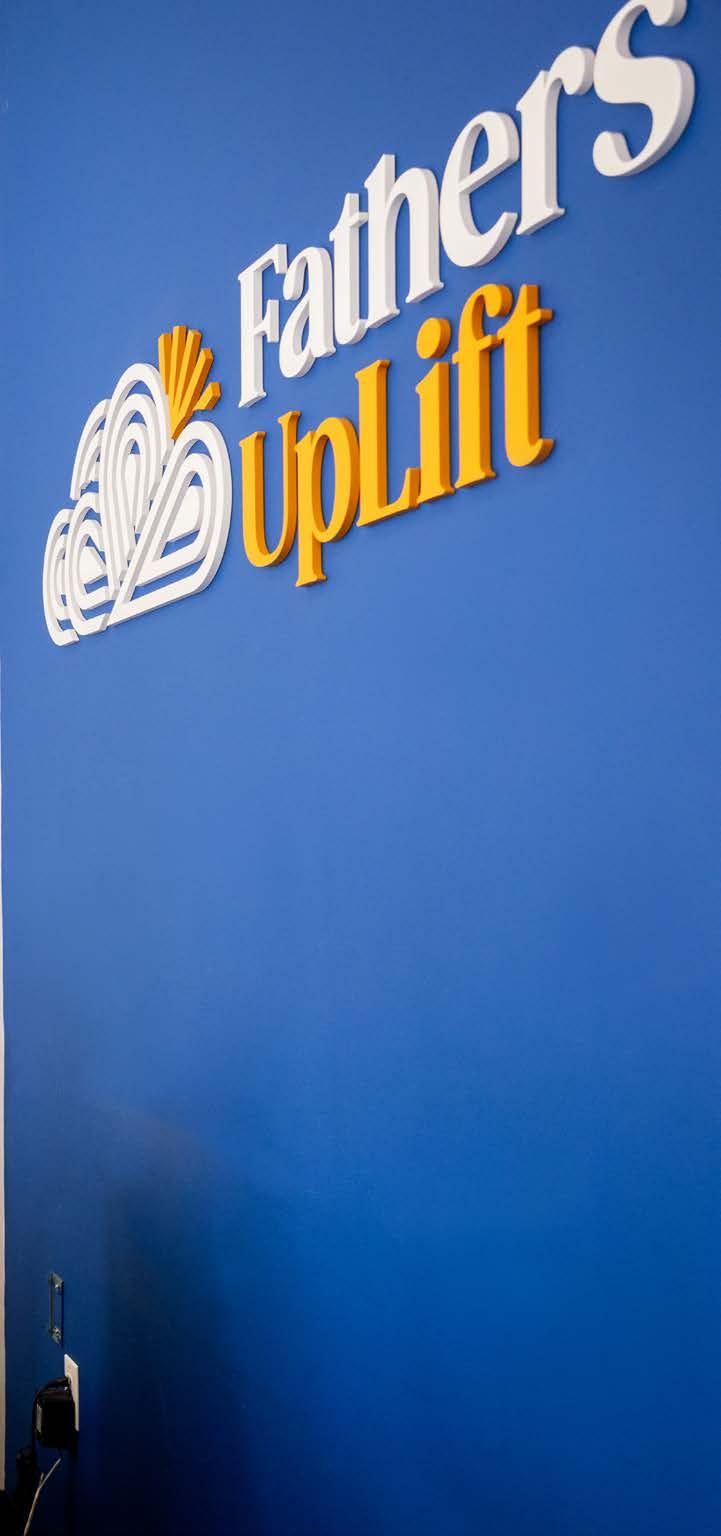
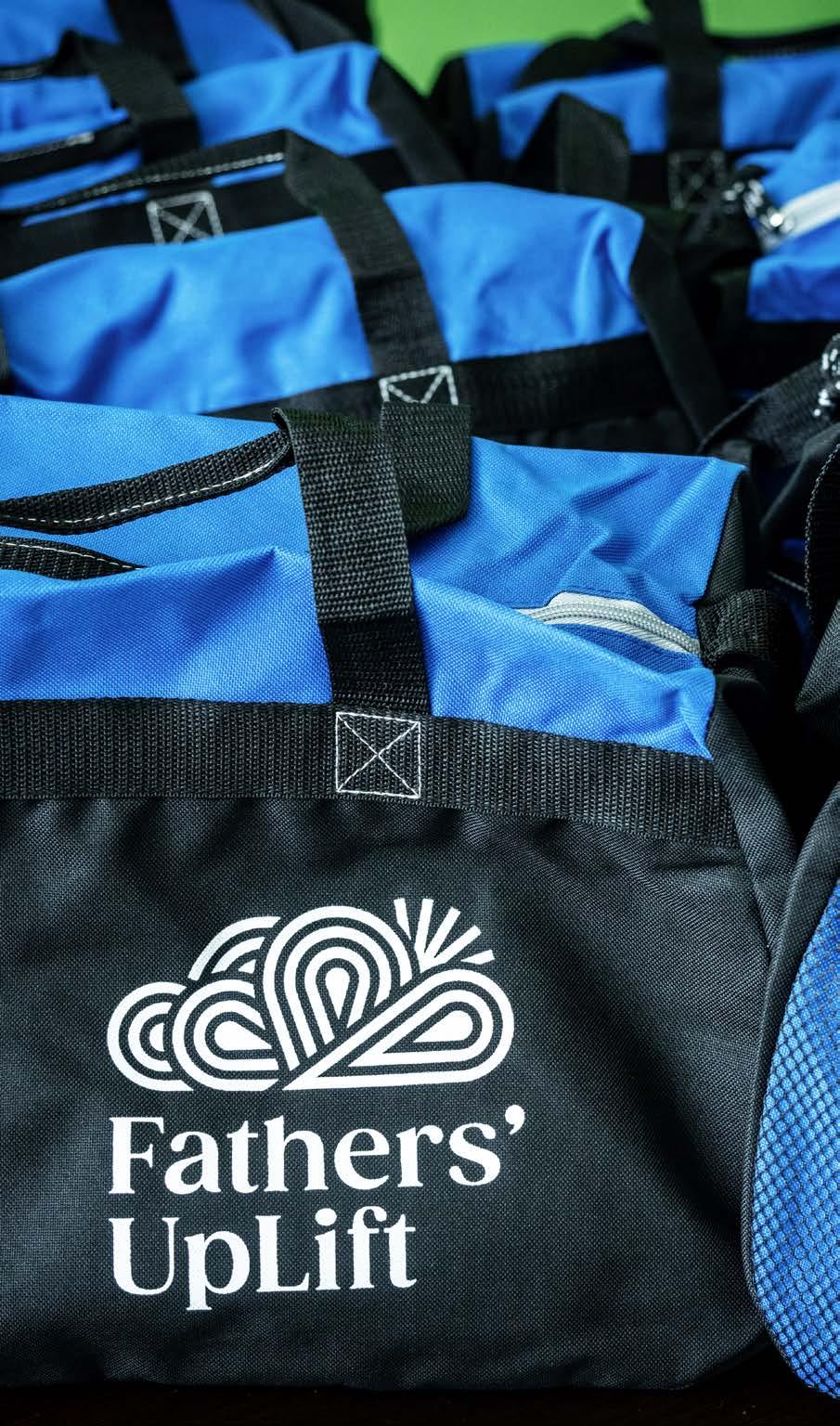
TOTAL SERVED
~900 family members estimated to have been impacted $195,000 in stipends provided to future BIPOC therapists in the USTR Fellowship & interns
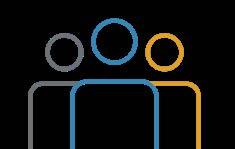
560 Bags for Dads provided to men in reentry
3,973 individual encounters
883,509 social media reach 17% more encounters per client than 2022
12 BIPOC Fellows trained
18 Affiliates/Partner Sites trained
Everything about Fathers’ UpLift is so amazing and wonderful.
—anonymous client
100% of clients definitely (81%) or probably (19%) would recommend Fathers’ UpLift to others
95% reported definite or somewhat improved relationship with self
93% reported definite or somewhat improved relationships with children
88% of fathers are actively engaged with their children
86% reported improved quality of life
7% & 2%
average decrease in Distress & Vulnerability scores, respectively
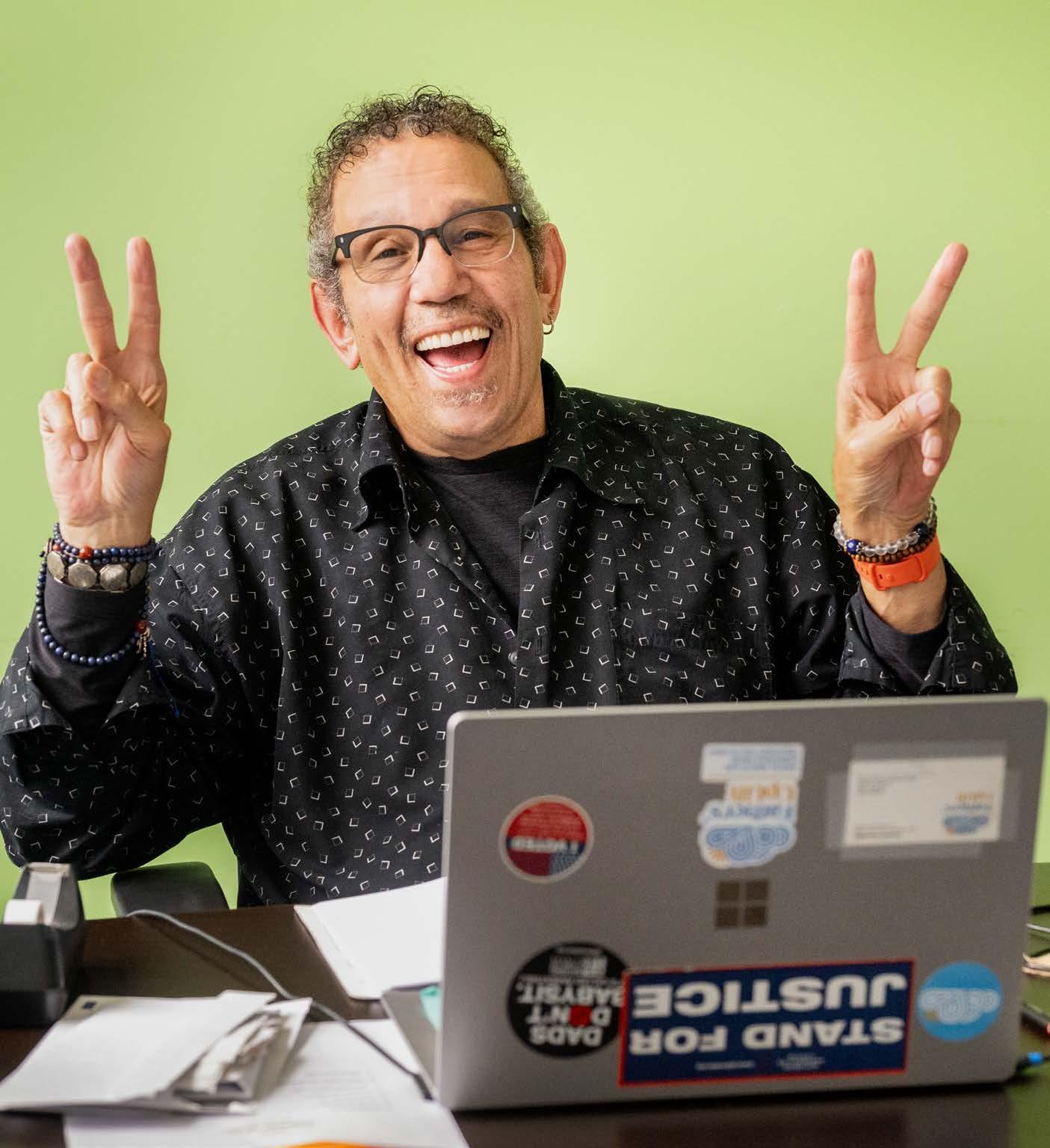
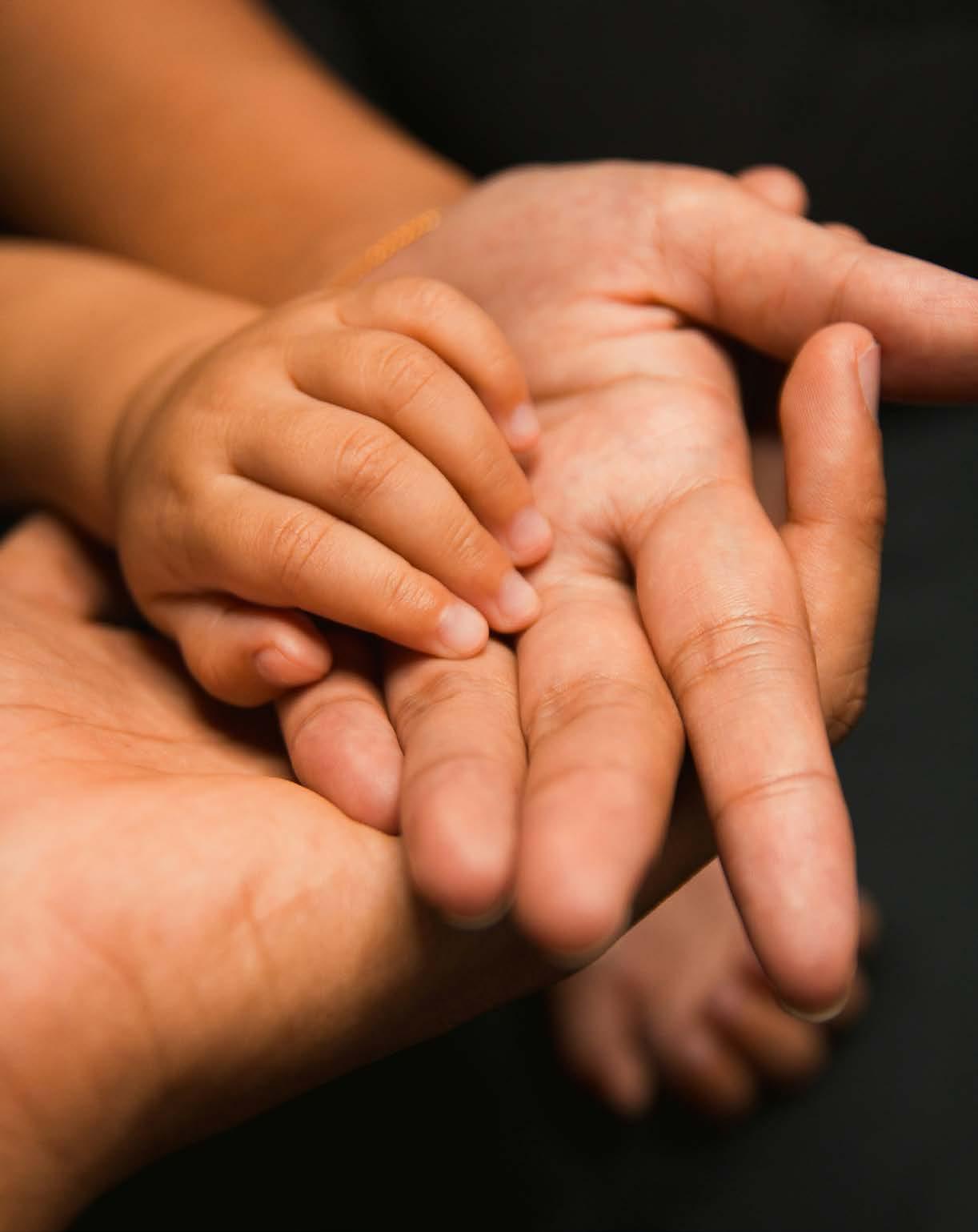
During the first nine months of 2023, the opioid crisis in MA only worsened, based on data from the Massachusetts Department of Public Health. Substance use disorder (SUD) and overdoses are major issues affecting the clients and communities we serve in greater Boston, impacting them at alarming rates.
Opioid overdose deaths accounted for 2.9% of all deaths in MA from January through September 2023. However, opioid overdose deaths accounted for over 7% of deaths for Black residents and 10.6% of deaths in Hispanic populations during this time period. Additionally, 72% of overdose deaths were men.
Tragically, 91% of these opioid overdose deaths occurred in adults between the ages of 25-64 — significantly younger than the average life expectancy. These horrific data exemplify the necessity for Fathers’ UpLift and services like ours to address the urgent needs of our communities. Our wraparound coaching and clinical support, as well as our robust referral network, help us to meet clients where they are, whether that means preventing drug use in the first place, managing and attenuating current substance use, or helping build resilience against relapse. We stand with our clients to offer support in every way we can.
Meet Matthew Molina, a 37-year-old of Guatemalan descent who was born in the US, navigated life in Boston for a time, and is now living back in Guatemala. Despite facing homelessness and numerous challenges in the States, Matthew’s heart remains full of kindness and selflessness. Blessed with a newborn daughter with his partner, he’s a man who continually seeks out resources to not only better his situation but to aid others through his connections with Fathers’ UpLift.
Matthew’s life took a challenging turn at a young age when he began his drug use. It started with marijuana as a teenager, but he began using cocaine around age 24 and prescription opioid pills within a couple more years. The situation reached its worst in his early 30s, when he was spending thousands per month on drugs just to “feel himself” amid the dependency that developed. This eventually led to the disintegration of his first marriage, a battle with homelessness, and a stint of other troubles. The grip of addiction cost him not only his financial stability but also precious time and relationships.
Matthew began his journey to recovery around 2020. Still facing obstacles and consequences from his past, Matthew heard about Fathers’ UpLift in March, 2023, from one of our partners. Upon his introduction to Fathers’ UpLift, Matthew was ready to hit the ground running, as he had his first child
on the way and was ready to invest in himself further to be the best dad and partner he could be.
He felt “immediately welcomed as a friend or family member” and enrolled in several programs:
• HomeComing Program: Aiding his transition back into society.
• Pre-Father Care Course: Preparing him for the arrival of his newborn daughter.
• Wellness & Recovery Course: Helping him maintain emotional stability and sobriety.
• Managing Emotions Course: Equipping him with emotional intelligence and wisdom.
• Drop-in Group: Providing a peer support group to both learn from and share with.
These programs equipped Matthew with the tools to prepare for his newborn baby girl and stay emotionally stable. When in the US, he didn’t always have stable housing or food, so he always looked forward to group courses for the food and camaraderie shared with other men and fathers who share their diverse but relatable experiences. Matthew remains enrolled in all of these programs to this day, engaging remotely from Guatemala. He currently works in customer service, where he frequently employs many of the skills he developed through FUL’s courses.
Now sober from opioid use for nearly five years and cocaine for nearly two, Matthew finds being able to share his testimony very rewarding. While he cites his higher power
for helping him achieve sobriety, he partially credits Fathers’ UpLift’s support for helping him maintain it, as well as give him an opportunity to share and help others.
Currently in Guatemala, Matthew is dedicating his time to building his relationships with his partner and newborn daughter. The support of his coach and clinician, as well as the rest of Fathers’ UpLift, has buoyed him through his journey after overcoming addiction, and Matthew feels more equipped for fatherhood than ever; he is now a proudly involved and loving father. His story is one of resilience — a testament to the power of support, guidance, and personal determination.
Matthew continues to promote Fathers’ UpLift’s work to other individuals who have needs we could assist with, and he is dedicated to partnering with us in our ongoing mission.
Matthew’s story reflects the core values of Fathers’ UpLift: Empowering men to overcome challenges and become better fathers through support, guidance, and community. His progress is a beacon of hope and an inspiring testament to the transformative power of dedicated fatherhood programs.
At Fathers’ UpLift, we are committed to nurturing both the internal and external aspects of our clients’ lives, understanding that addressing internal challenges through clinical therapy is crucial for overcoming internal problems that can have huge effects on how individuals handle external obstacles. This year, we’ve seen substantial progress in our clinical work, with a total of 2,522 clinical visits, where our therapists have helped men tackle emotional and behavioral health issues that impact their role as fathers.
Our Clinical Therapy program is designed to improve the emotional and behavioral health of men and families. With licensed therapists who share racial, cultural, and lived experiences similar to those of our population, we aim to reduce the stigma around mental health for men of color and provide effective strategies and coping mechanisms. This tailored approach helps improve our clients’ mental health and overall quality of life, enhancing their ability to be present and engaged fathers.
Fathers’ UpLift therapists are skilled in assisting fathers and their families in navigating complex dynamics such as parenting, trauma, depression, anxiety, and domestic violence. Our services are especially pivotal for first-time fathers and those re-entering their children’s lives after an absence, as well as for men facing co-parenting stressors.
Our individual therapy sessions focus on the specific needs
of fathers, providing them with the tools to address personal challenges and improve their emotional resilience.
This year we completed 2,279 individual therapy sessions.
Family is central to our mission. In our family and couples therapy sessions, we facilitate healthy communication strategies, helping parents heal from past hurts so they can be fully present for their children. Our approach includes PreFather Care, Cognitive Behavioral Therapy (CBT), Mindfulness, and other strengths-based methods tailored to support families on their journey towards happiness.
Fathers’ UpLift also offers group therapy, which serves as a community support system where individuals share their experiences and challenges. These sessions promote selfcare and healthy community interaction, supporting fathers, mothers, and youth in weekly groups.
As we continue to build on the successes from 2022, our clinical services remain a cornerstone of our mission to uplift fathers and strengthen families, providing them with the necessary support to transform their lives and the lives of their children.
This year we completed 243 family, couple, and group therapy sessions.
I have been with Fathers’ UpLift for about 18 months, and just having these supports in place when I need them has made my life so much easier and much fuller as far as life goes. The coaches and counselors, such as Esteban and Cori, are so amazing.
—anonymous client
rated individual therapy as good or excellent
rated family/couples therapy as good or excellent
OVERALL RATING FOR INDIVIDUAL THERAPY 3.74/4
reported definite (76%) or somewhat (19%) improved relationship with self
feel “completely” or “mostly” hopeful about their future
6% decrease in average PHQ-9 scores among clients (a clinical assessment for depression)
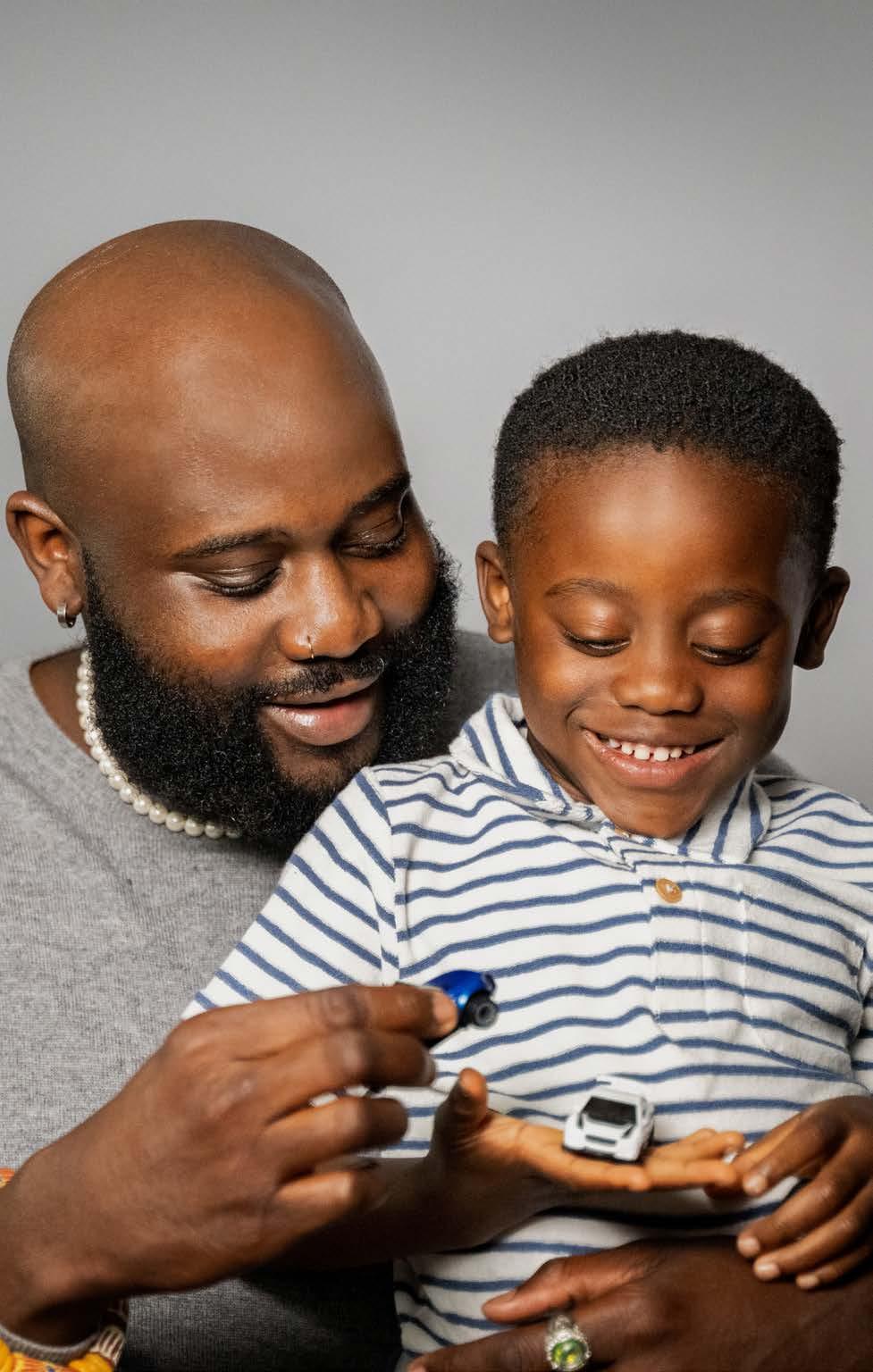
In 2023, we served approximately 173 individuals with nearly 1,500 wraparound coaching encounters and peer-to-peer ambassador mentorship services. We also provided approximately 560 Bags for Dads to men in reentry.
Coaching is a key component of our programming. We intentionally hire staff who share similar lived experiences with our clients to quickly and effectively build rapport and trust—key components of successful coaching relationships.
While we talk about clinical therapy helping clients overcome the internal barriers that stand in their way, coaching is more about addressing the external barriers. Those could be in the realm of housing, employment, custody/divorce court, food security, substance use, physical safety, transportation, or anything else our clients face. Coaches work with each client to develop goals and a plan to address the obstacles they face, offering relentless support. We remind clients that they are the authors of their own stories.
In addition to individual coaching, we also offer group coaching courses for various topics: Managing Emotions, Wellness & Recovery, and Pre-Father Care are our current course offerings. Each week, a group of clients gathers to learn and discuss a topic in the curriculum.
The final essential aspect of our coaching program is our peer-to-peer mentoring program: the Ambassadors. Ambassadors are former clients who have made substantial progress in achieving their goals and successful outcomes. Fathers’ UpLift offers Ambassadors a stipend to work part-time as peer mentors for current clients going through the very difficulties they have worked through, themselves. Ambassadors operate on an annual cohort model, and we now have a rich roster of former Ambassadors. We recently formed the Ambassador Alumni Association to keep these individuals connected and involved in our work, continually shaping and refining our programming to make it even more effective in meeting clients’ needs, helping men to be the fathers and family members they know they can be.
“Everything plus 10. I am 100% completely satisfied with the work that FUL has given me since
inception.
FUL
has given me more than I expected. I thought I would continue to lie and use while I was getting help. This has worked beyond my belief. This is the first time I’ve wanted to stay clean. I thought I was going to die the way I was going. I know there is a god and that god loves me. I fight daily to make decisions not to get high, and it’s getting easier.”
— anonymous client
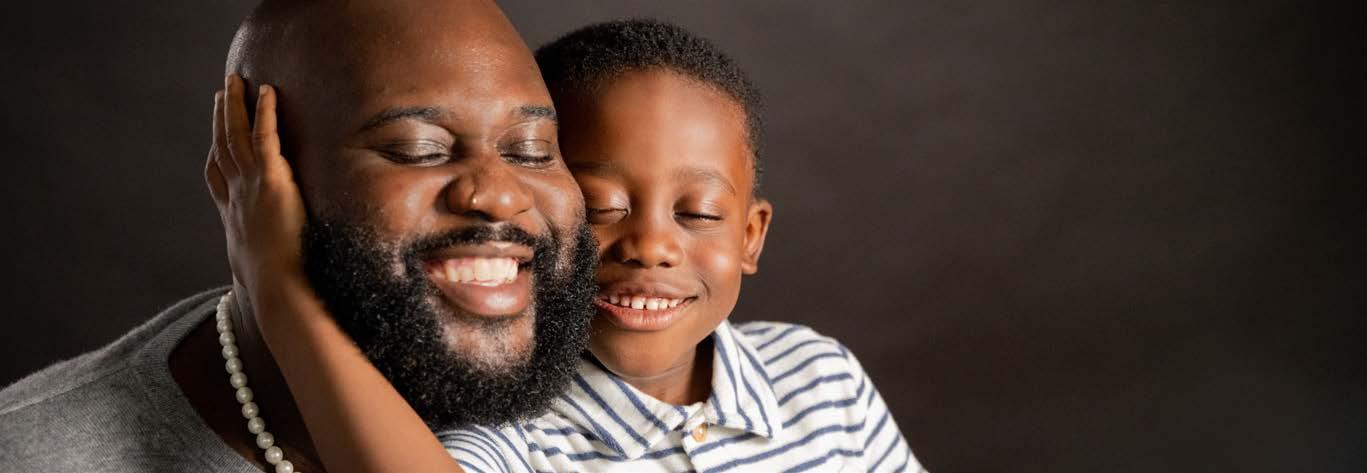
3.7/4.0
3.1/4.0
INDIVIDUAL COACHING AND GUIDANCE GROUP INTERVENTION
of clients rated individual coaching as good or excellent
“strongly” or “somewhat” agree that “I feel confident about my ability to achieve my desired goals.”
“strongly” or “somewhat” agree that “I feel comfortable that I can deal with the frustrations of parenting.”
REDUCTIONS IN VULNERABILITY FACTORS: REDUCTIONS IN DISTRESS FACTORS:
in difficulty getting a job
in difficulty managing time


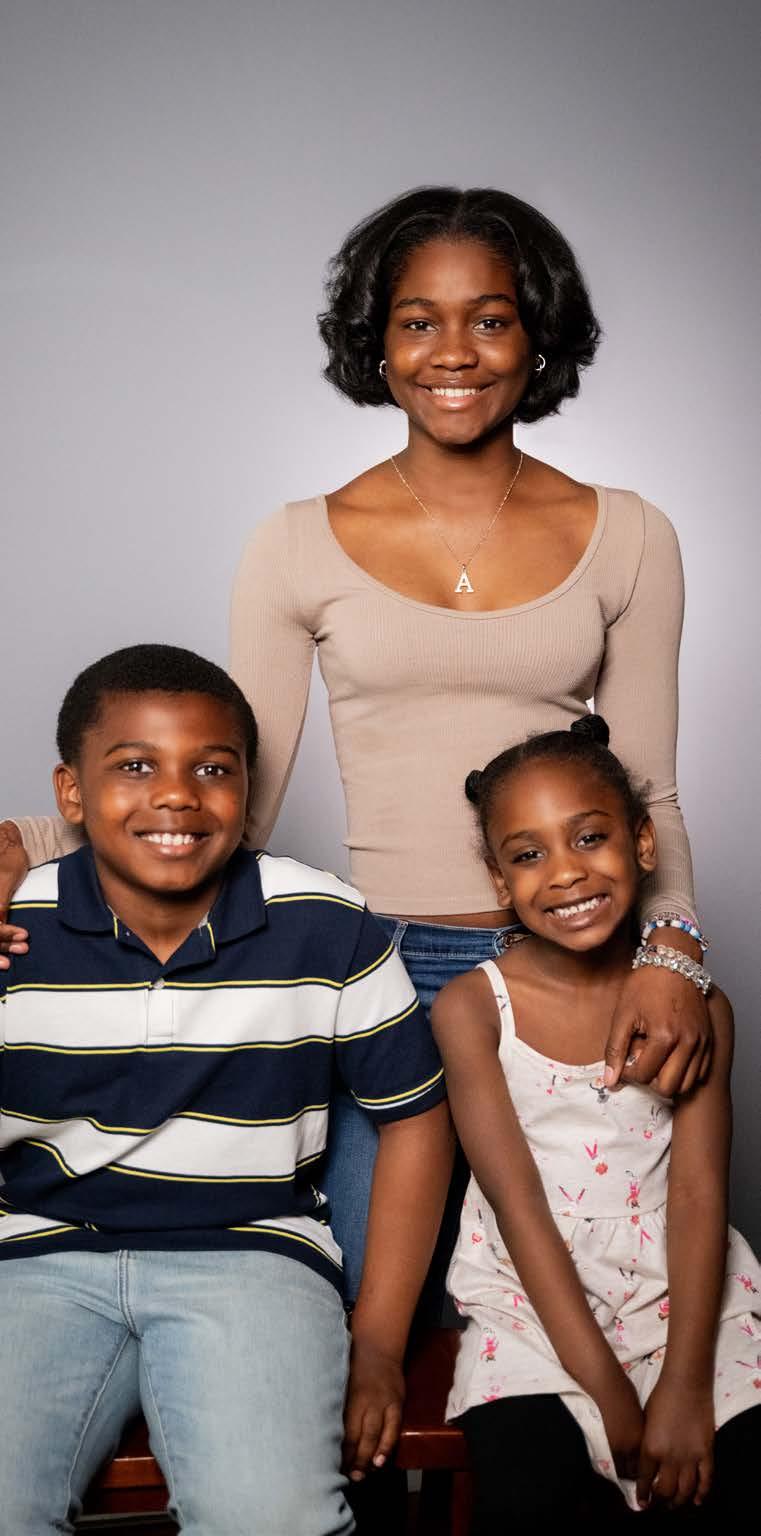
improvement in awareness of legal advice
CLIENTS’ AGREEMENT WITH “FUTURE HOPEFULNESS”
increase in hopefulness about their future
“Completely” or “Mostly” true responses
improvement in average relationship rating with family members
Bags for Dads provided to men in re-entry
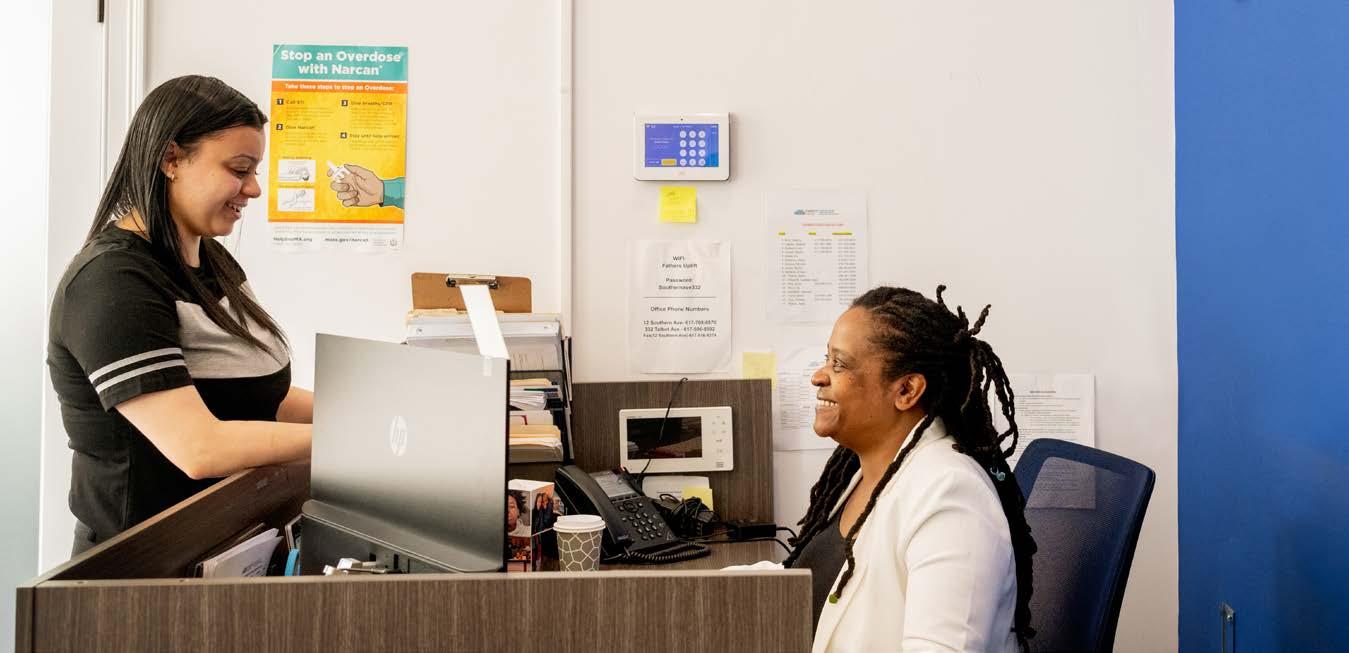
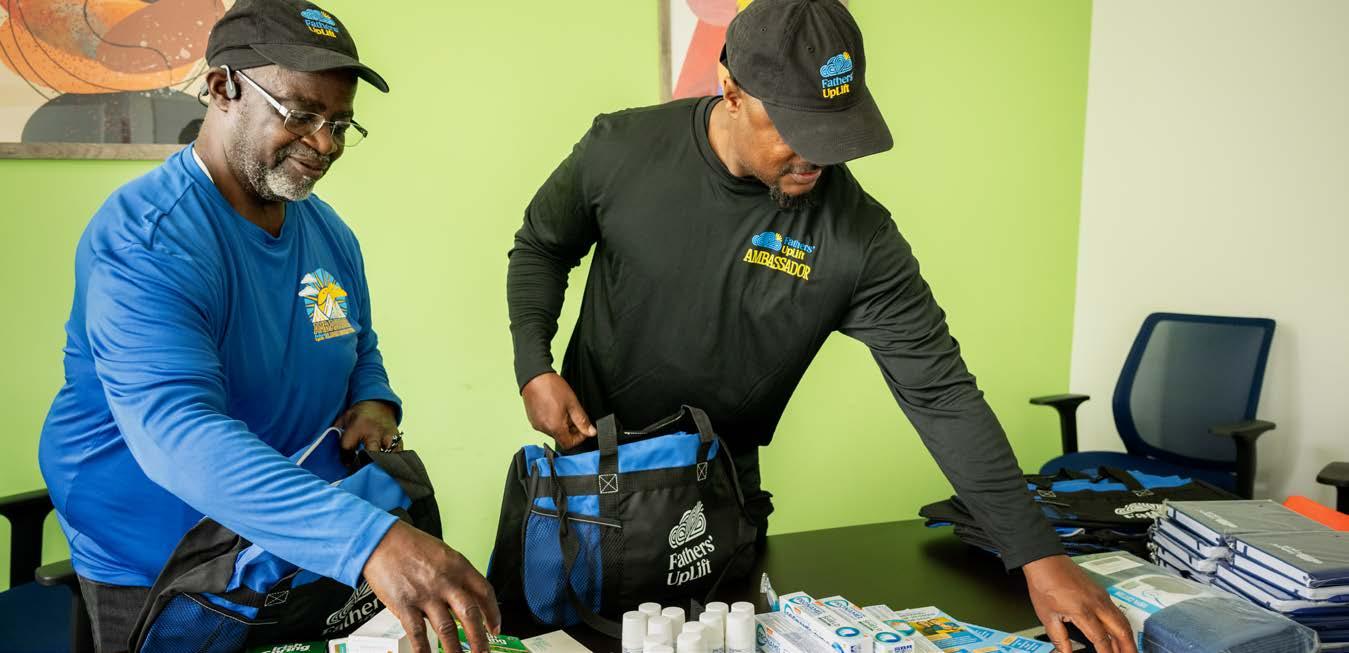
At Fathers’ UpLift (FUL), we understand the profound impact a father’s presence has on a child’s life. Data underscores the severe consequences of father absence, including increased risks of incarceration, substance abuse, and educational failure. Our Youth Enrichment Program is dedicated to mitigating these outcomes by providing robust support and positive male role models to youth primarily from the underserved Boston neighborhoods of Dorchester, Roxbury, and Mattapan.
In 2023, we began giving whole-school support to the Academy of the Pacific Rim in Boston to build this partnership.
In August, we hired a Youth-specific coach and served 8 youth with direct services. Now (in 2024), we have significantly ramped up this caseload and anticipate serving more youth with more breadth and depth of services going forward. Our program operates with a couple key partners, primarily in collaboration with the Academy of the Pacific Rim, located in the diverse community of Hyde Park. It targets at-risk youth aged 5–18, integrating personalized
coaching and clinical therapy to address their unique challenges. Over 80% of our program-facing staff are people of color, aligning with the cultural and social backgrounds of the communities we serve, ensuring a deeper connection and understanding.
Youth enrolled in our program receive tailored support starting with individual assessments to identify specific needs, followed by one-on-one therapy and group activities based on evidence-based interventions like A-CRA and AMP. The program not only focuses on alleviating the impacts of father absence but also enhances mental health, educational engagement, and social connections. Our youth podcast initiative empowers participants to develop and express their voices, contributing positively to their self-confidence and community involvement.
Despite our successes with this program, challenges persist, including addressing the deep-rooted stigmas surrounding mental health in marginalized communities, particularly among school-aged youth. Balancing resource allocation between immediate intervention and long-term developmental programs remains a delicate task.
Looking ahead, Fathers’ UpLift plans to expand our outreach by integrating more comprehensive family involvement strategies, including investing in family therapy to enhance father-child relationships. We aim to increase the frequency and variety of our off-
campus activities, such as cultural outings and retreatstyle events, to strengthen community bonds and support networks for youth. Funding remains a critical component, and we are actively seeking partnerships and grants to sustain and grow our impactful work.
The Youth Enrichment Program at Fathers’ UpLift remains a key component of our mission to foster resilience and improve life outcomes for children affected by father absence and systemic obstacles. Through dedicated efforts and community collaboration, we are making significant strides toward a future where every child has the support and guidance needed to thrive, regardless of their familial circumstances.
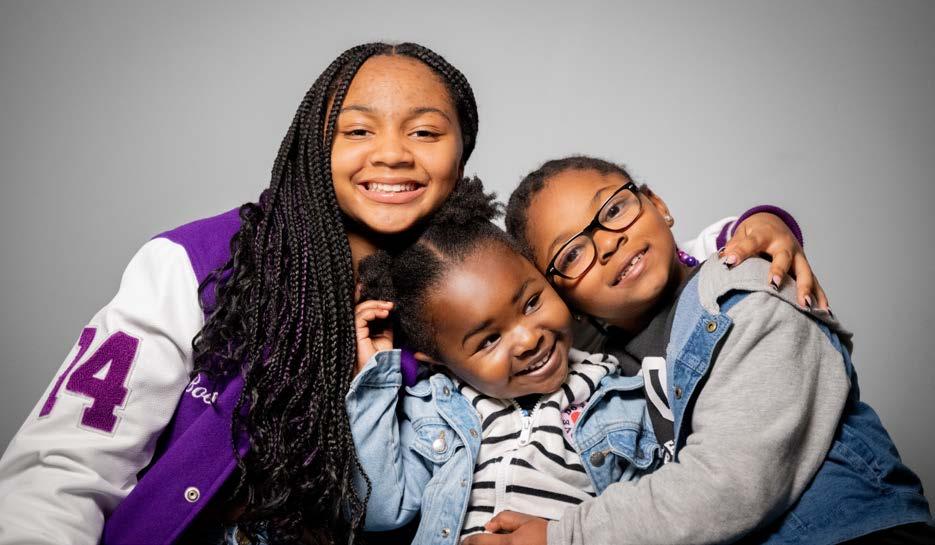
As Fathers’ UpLift evolves, we’ve transitioned our Male Engagement Institute (MEI) to the Affiliate and Educational Opportunities Department (AEOD). This change allows us to incorporate the effective elements of MEI, while narrowing our focus to increasing both the number of social workers equipped to serve BIPOC fathers, and increasing the number of affiliate partners utilizing our programming. AEOD focuses on expanding our reach and impact by training BIPOC social workers and strengthening affiliate partnerships. This streamlined approach builds on MEI’s goals, promoting systemic change and better support for the communities we serve.
The AEOD’s mission is extending Fathers’ UpLift’s reach beyond our Boston base to effect positive change in communities nationwide. Through partnerships with agencies using our Pre-Father Care or Managing Emotions curricula, we have facilitated crucial support for fathers and prospective fathers, ensuring they have the guidance needed to positively engage in their children’s lives.
This year, under the leadership of Lillian Rice and Dr. Charles Daniels, and later joined by Dr. Anthony Owens, the AEOD successfully engaged over 18 organizations in implementing our programs across diverse locations. Notable engagements included:
• Free Spirit Evangelistic Outreach in Daytona Beach, FL, where we trained three facilitators and supported the integration of the Managing Emotions Curriculum.
• Bridges Homeward in Cambridge, MA, where ongoing engagement culminated in a significant training session led by a USTR Fellow for 15 individuals.
• Batonga Foundation (Benin, West Africa): Completed Affiliate Engagement on 4/20/23, trained 43 individuals with $2000, technical support, and held a debrief on 8/2023.
These efforts underline our strategy to embed our impact deeply within communities through capable local hands.
2023 was certainly a year of finding our footing in this department. We learned that the cycle of training an Affiliate will take more time and involvement than originally anticipated. We want to truly be able to invest in each Affiliate and do it right. As we consider how to reframe our approach, we are discussing funding strategies to support the involvement required in this process. Beginning in 2025, once the program is more established with a proven track record, we anticipate charging Affiliate organizations an annual fee for training and access to our effective methods. More on this front to come!
In December 2022, Fathers’ UpLift was awarded a substantial grant to launch the USTR Fellowship aimed at increasing the number of BIPOC therapists. This fellowship has been designed to provide these emerging BIPOC social work professionals with not only financial support but also robust mentorship and licensure preparation.
In its inaugural year, the fellowship selected 14 promising candidates from a pool of 24, reflecting a rigorous selection process. Though two candidates were unable to continue due to unforeseen circumstances, the remaining 12 fellows have shown remarkable progress and dedication. They received over 75 hours of mentorship from 11 licensed therapists across eight states and 150 hours of clinical supervision from Cori Williams, LICSW, emphasizing the depth and breadth of support provided.
White therapists currently have a licensure exam pass rate of 80% on the first try, while the BIPOC pass rate sits around 40%. We find that unacceptable and are working to bridge that gap. In our first year of the Fellowship, we provided a full semester of licensure prep to help our BIPOC therapists achieve better success in exam passing rates. We do not have that data yet but are excited to see the results in the future. In subsequent years, we plan to offer two full semesters (fall and spring) of this licensure prep to ensure a full year of support.
In early 2024, the Fellows embarked on an in-person retreat to Montgomery, Alabama, at the Legacy Museum, immersing participants in African American history through guided tours, interactive exhibits, and debrief discussions. The program explored African Americans’ rich and complex history, highlighting their struggles, triumphs, and contributions. Summit sessions featured thoughtprovoking talks, guest speakers, and panels on critical African American history and culture issues, fostering dialogue and collaboration. Participants had the opportunity to connect with others, engaging in meaningful conversations to strengthen their bond as a cohesive unit.
Our achievements this year have been marked by significant training successes and strategic partnerships. However, we’ve also faced challenges such as unresponsiveness from potential Partner Sites and logistical hurdles in coordinating across different states. These challenges have been met with a strategic and patient approach, ensuring that our mission advances without compromising quality of services.
The key lessons from this year emphasize the importance of diversified communication, persistent engagement, and flexible collaboration strategies.
As we move through 2024 and beyond, FUL is committed to streamlining the focus of the AEOD on the USTR Fellowship, prioritizing this initiative alongside other departmental
activities. The organization will shift its perspective on Affiliates, now deemed Partner Sites, to enhance collaboration and mutual success.
FUL will emphasize strengthening fellow placement at Partner Sites that are interested in receiving support and facilitating groups aligned with the mission. By concentrating efforts on therapist recruitment and increasing the number of BIPOC Clinical Social Workers in the field, FUL is poised to elevate the impact and effectiveness of this essential program, ensuring a bright future for its recruitment endeavors and strategies to improve the low number of BIPOC licensed therapists. While offering placement options at other sites for interrelated fellows, FUL will uphold quality standards for learning, mentorship, engagement, and licensing preparation across our headquarters office in Boston, MA, and all partner sites, locally and nationally, to ensure consistency and excellence in the fellowship program.
The progress of the USTR Fellowship and the expansion of our affiliate network through AEOD’s efforts in 2023 are just the beginning. Fathers’ UpLift is poised to continue this momentum, ensuring that our mission to heal, uplift, and empower fathers extends across the United States, transforming lives and strengthening families in communities far and wide.
PROGRAM RATINGS
Fellows rated the program with the following scores:
4.4/5 prepared me to enter the mental health field
4.6/5 provided practical experience & hands-on learning
4.6/5
fostered a supportive & inclusive learning environment
4.7/5
offered opportunities for networking & building professional connections
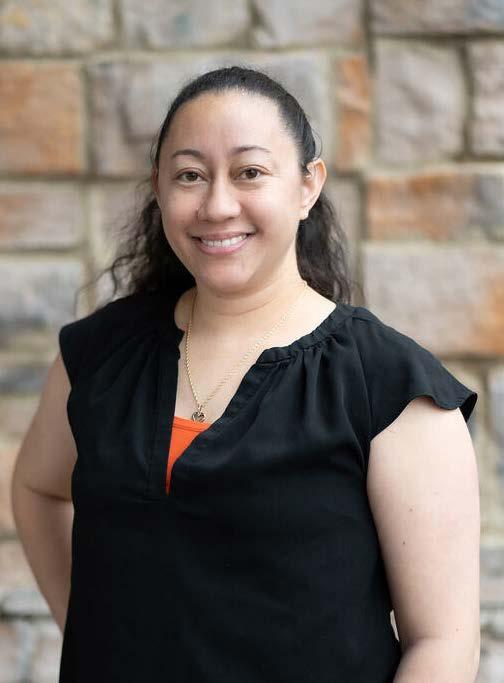
Angelina Vickers, a Licensed Mental Health Counselor, lives with her husband and four children in Daytona Beach, Florida. She holds a Master’s degree in Counseling Psychology with a focus on clinical mental health from Bethune-Cookman University.
Angelina’s counseling philosophy is rooted in the belief that we are all designed for connection and relationships. She posits that our thoughts and emotions significantly influence our behavior, and that our early childhood relationships shape our lifelong interactions. Her specialty lies in an integrative approach that is strengths-based, recovery-focused, and trauma-informed, serving primarily women and children in her community.
As a registered Circle of Security Parenting Facilitator, she takes pride in assisting Black, indigenous, and people of color in creating a sacred space to empower them to develop practical life skills and grow as authentic
individuals within their communities. Furthermore, she is dedicated to demystifying mental health and promoting mental wellness among the general populace, particularly within faith-based organizations. Angelina is also the proprietor of Sacred Space Counseling and Consulting located in Daytona.
Angelina has been recruited by Dr. Anthony Owens, the Affiliate Manager of Educational Opportunities at the United States Recruitment Fellowship Program, to serve as a mentor in the program. As a USTR mentor, she offers guidance, support, and mentorship to second-year graduate students pursuing advanced degrees in Mental Health Counseling.
Due to Angelina’s exceptional contributions to the fellowship program, she was chosen as a keynote speaker for the 2024 USTR Growth Retreat in Montgomery, Alabama.
Marcel Mcclain, a 40-year-old African American from Sacramento, California, now lives in Boston, where he is a student at Boston College pursuing his Masters of Social Work (MSW). Marcel’s journey is marked by a pivotal career change and a deep commitment to bringing emergent therapy modalities to Black communities that are too often sidelined in mental health services.
Formerly employed in public administration, Marcel felt a compelling urge to pivot toward the mental health field. His motivation was to make emerging mental healthcare services more accessible to the BIPOC populations who are frequently underserved.
Marcel’s introduction to Fathers’ UpLift came during his search for summer opportunities as a second-year MSW student. Drawn to the USTR Fellowship’s offer of mentorship, networking, and licensure test preparation, he saw it as an excellent opportunity to serve and learn about the often-overlooked population of Black fathers. He wanted to go beyond the general and supposedly universally applicable principles he was learning in school to test the waters in real-life, higher-stakes situations with diverse clientele.
In September 2023, Marcel joined the first cohort of the Fathers’ UpLift USTR Fellowship, engaging in a clinical experience that brought unexpected cases and invaluable lessons. He worked with clients who represented a diverse range of needs, including a young girl facing sexual trauma, a father who was arrested and placed in a mental institution following a clash with the Department of Children and Families, and a senior male battling long-term substance use disorder. These experiences underscored the complexity of mental health challenges faced by vulnerable populations and the critical need for culturally competent interventions in the mental health field.
Struggling to feel as though he was making progress with his young female client, Marcel’s supervisor reminded him that just
being a positive Black male role model was a significant success in itself.
One poignant moment of Marcel’s fellowship was his witnessing a criminal hearing for one client, where he saw firsthand the detrimental effects of a misunderstood man lacking access to appropriate services and coping mechanisms amidst an incredibly invasive and oppressive system. This experience solidified Marcel’s resolve to advocate for more accessible mental health resources for vulnerable groups.
“I’m an exponentially better mental health professional now than when I walked in the doors, and it didn’t take a huge caseload to do that,” Marcel shared. “I can never rest on the level of skills I have.” He was always thinking about how to be an adaptable therapist and try new approaches, giving his cases lots of thought outside of sessions. “I’ve learned that this work very much requires all of my mental resources.”
Marcel was also able to sit in on our group courses of Wellness & Recovery and Homecoming groups. He said that the ability to sit with and hear from these highly stigmatized groups taught him that the stigmas we place on those on the fringes rarely apply, and his insights from these sessions will never leave him.
The fellowship enriched Marcel with both practical skills and theoretical knowledge, sharpening his capabilities as a mental health professional. He lauded the mentorship he received from his clinical supervisor, who Marcel described as “a relentlessly positive and encouraging presence.” He also credits his clinical supervisor at FUL for constantly reminding him that “the client is always the expert” and that his approach always needed to center the client and not the modality. This is a lesson that will endure for Marcel.
Marcel appreciated the advice his cohort received from guest speakers and leaders in the field, which expanded his professional network and deepened his understanding of the societal barriers
faced by his clients. He recognized that effective client outcomes hinge more on relational dynamics than generalized teachings. Regarding the other members of his cohort, “There was such a deep feeling of family built that will last long after the fellowship is over.”
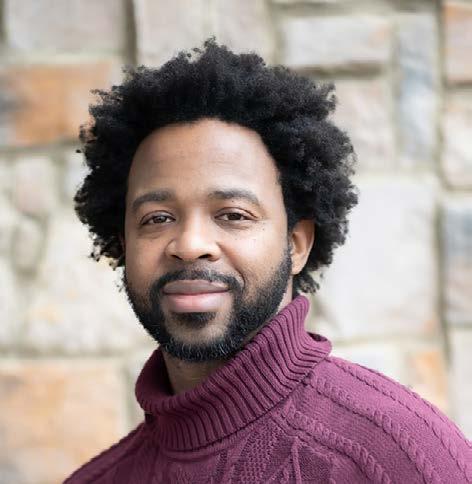
Planning to graduate in the spring of 2024, Marcel feels profoundly prepared, both practically and mentally, for his future endeavors. He noted that much of what he learned was intangible outcomes that he “wouldn’t have known [he] needed to learn before becoming a professional.”
Marcel plans to work with a small group of clients at Fathers’ UpLift while exploring opportunities that align with his passion for this work. His long-term aspirations include developing a socioemotional health curriculum for Black youth in school and offering intensive therapy for the formerly incarcerated, leveraging his expertise to make a lasting impact on those at the edges of society.
“I’m an exponentially better mental health professional now than when I walked in the doors, and it didn’t take a huge caseload to do that,” Marcel shared. “I can never rest on the level of skills I have.”
Marcel Mcclain’s transformation from a public administrator to a mental health advocate exemplifies the power of purpose-driven change and the profound influence of supportive, community-focused programs like Fathers’ UpLift’s USTR Fellowship.
Tamanda Chitalo, a native of Malawi, recently celebrated her 30th birthday. She embarked on a transformative journey from Malawi to the US in 2022, driven by her aspirations to deepen her expertise beyond her Bachelor’s in Communication and pursue a Master’s in Clinical Social Work at Indiana State University. In Malawi, Tamanda spent seven years teaching elementary school and serving as a sort of unofficial mentor to older students. This role ignited her passion for addressing the psychological needs of young people—a need highlighted by the absence of mental health services in her home country.
Tamanda’s decision to pursue social work stemmed from her desire to offer more to her students who confided in her their personal challenges. Recognizing the limitations in her ability to assist them effectively, she aimed to acquire skills that could foster real change. After receiving a scholarship from Indiana State, she was able to transition to the US to pursue her MSW. Tamanda has enjoyed her time in graduate school, though she has faced challenges as the only international and one of the only Black/African American students in her cohort. Tamanda felt like there was a real sense of belonging and community still missing.
Her journey took a significant turn when she discovered Fathers’ UpLift through a LinkedIn connection. Our USTR Fellowship program was the beacon of community and support she was looking for. Joining the first cohort in September of 2023, Tamanda uniquely tailored her involvement to spearhead a podcast project that allowed her to merge her communications expertise with her new focus in social work. Covering topics such as women’s history,
BIPOC therapists, and more, this initiative not only enriched her educational experience but also enhanced her visibility and impact as an emerging therapist. Simultaneously, she navigated a new realm of telehealth sessions with FUL clients, adding practical therapy experience to her portfolio.
A vital part of Tamanda’s experience was a biweekly mentorship meeting with an experienced therapist, who offered insights into private practice, personal branding, and more. This mentorship, coupled with her participation in the Fellows retreat and the supportive fellowship cohort, transformed her experience in Indiana, helping her feel part of a family dedicated to mutual growth and support.
“For me, it’s been life-changing. I really needed this community that I have. I kind of felt like I was doing it on my own in Indiana, but when I met this cohort and [the directors], I felt like I had a family,” Tamanda shared.
As Tamanda continues her Master’s program, with one more year to go, the fellowship has been pivotal in preparing her for her licensure exam and broadening her understanding of the opportunities an MSW can provide. The rigorous nature of the program required her to balance numerous responsibilities, a challenge she met with dedication and a clear understanding of her motivations.
Reflecting on her journey, Tamanda feels a profound shift in her self-confidence and professional orientation. Her advice to upcoming fellows emphasizes the importance of dedication and understanding one’s “why.” She believes that her hard work, persistence, and determination have fundamentally shaped her life’s trajectory.
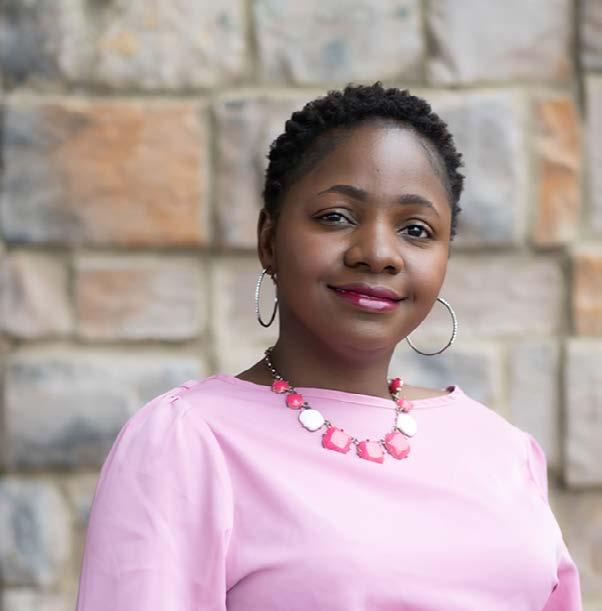
Looking ahead, Tamanda is open to exploring or creating opportunities that align with her enhanced skills and passion. Whether in clinical practice, community initiatives, or educational reforms, she is prepared to leverage her cross-continental experiences to make a significant impact on the lives of those on the edges of society.
“For me, it’s been life-changing. I really needed this community that I have. I kind of felt like I was doing it on my own in Indiana, but when I met this cohort and [the directors], I felt like I had a family,” Tamanda shared.
Tamanda Chitalo’s story is not just one of personal achievement but also a testament to the transformative power of cross-cultural experiences and targeted experiential education programs like the Fellowship offered by Fathers’ UpLift. Her journey underscores the importance of community, mentorship, and the continuous pursuit of growth in one’s chosen field.
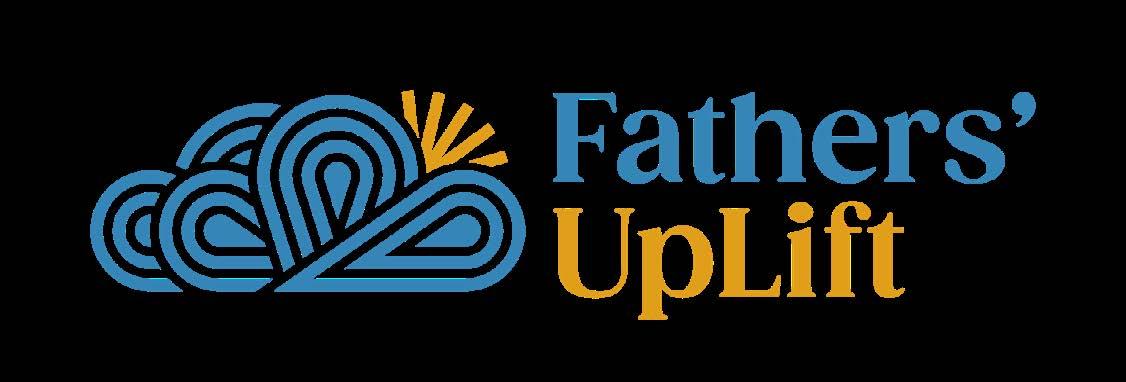

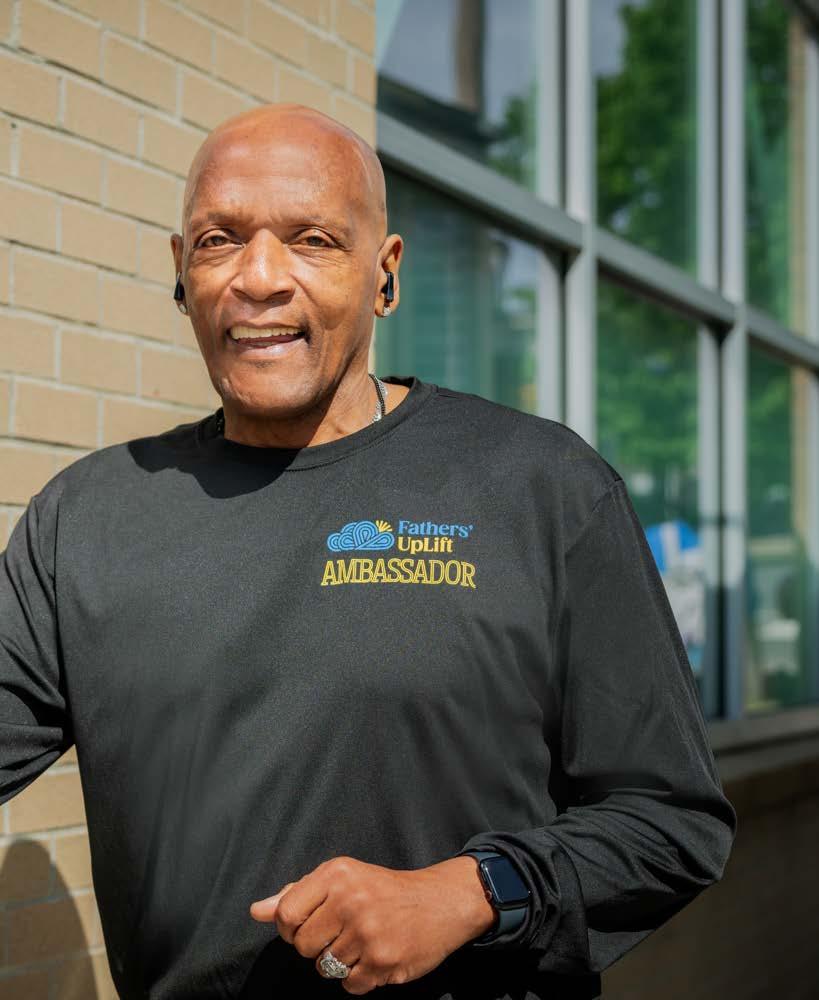
Thank you for your support of our mission to uplift fathers and families. Your contributions play a vital role in enriching the lives of those we assist. Here are several impactful ways you can support our efforts:
Your financial support is crucial to our nonprofit’s sustainability. Whether a one-time gift or a recurring donation, your donations directly fund our services, such as therapy and comprehensive support for fathers & their families. For instance, every ~$1,000 donation sustains a year’s service for one family, while ~$85 supports a month of service. Donations can be made quickly and securely through our website at www.fathersuplift.org.
If contributing $1,000 is beyond your current capacity, or if you’re looking to extend your impact, consider organizing a fundraiser! You can create a fundraising event on our website at www.fathersuplift.org/fundraise. Celebratory fundraisers during birthdays or holidays are excellent ways to raise awareness and support our mission effectively.
Join our efforts by hosting a Bags for Dads Drive, as our community partners did last year, helping us distribute over 500 Bags for Dads. To start a drive or join an existing one, please contact us at info@ fathersuplift.org. Your involvement can make a lasting impact on our community initiatives.
We deeply appreciate every form of support we receive. Together, we can create meaningful change in the lives of fathers and their families. Thank you for your continued commitment to Fathers’ UpLift!
Thank you to our partners and supporters who furthered our mission to help fathers and families flourish in 2023.
$100,000+
Massachusetts Department of Public Health
Massachusetts Executive Office of Health and Human Services
MA Office of Economic Development
Lynch Foundation
Fidelity Foundation
Inner Foundation
NewProfit Foundation
$50,000 - $99,999
Wellington Management Foundation
Nordblom Foundation
Blue Cross Blue Shield MA
The Schooner Foundation
$10,000 - $49,999
M&T Bank
Focus for Health
New Commonwealth Fund
Blue Cross Blue Shield MA
Bank of America
Cummings Foundation
TKHTSS Family Fund
Anonymous Donor City of Boston
Massachusetts Department of Mental Health
Highland Street Foundation
Stephanie Cornell Fish Family Foundation
$5,000 - $9,999
Margaret Carr
Charles Moore
$1,000 - $4,999
Lawrence Greenberg Trust
Andrew Ellis
Jordan Krasnow
Patricia Gray
Pat Gray
Alexandra Kinnard
Matt & Nicole Pritchard
Alex Trouten
Kimberly McGovern
Melody Jaros
Jonathan Tyson
Beth Dobins: on behalf of Baxter of California
$500 - $999
Reuben Hendler
Vicente Sanabria
Wendy Swart Grossman
Michael Chambers
Laura Yockey
Elizabeth Bonney-Cohen
APEX Media Partners: on behalf of JJ Jackson
<$500
Eva Redhe
Faith Blake
Nathan Roese
Andrea, Emma, Gia, Lindsay, Maggie, Micaela, Riki, Shannon
Jonathan Loehr
Danielle Gosdin
GPS Group Peer Support
Carolyn Pelzel
Renee Boynton-Jarrett
Michael Blomquist
Jeanne Celeste
Debra Ficara
Oliver Jefferson
Kelly Dunphy
John Regan
Lisa Arsenault
Meghna Nandi
Caitlin Wootton
Sam Weil
Richard-Judith Nicholas
Josh Spaulding
Ian Lai
Daniel Baum
Lauren Bursan
Emory Ward
Lexlin Consulting
Sherice Fry
Cecilia Schedin
Rachel Sundet
Heritage U U Church
Erin Quell
James Evans
Randi Ellingboe
Ewura Esi Brookman-Amissah
Margot Lenhart
Stephen Senna
Emily & Tom Edwards
Bodil Eriksson
Michael Shaldone
Madelyn Iles
Patricia Campbell
Twisted Alchemy
Joseph Burton
Peter Flannery
Julia Motl Lowe
Jaime Enos
GoodToday.org
Rhonda and Robert Pais
Nancy J Robinson
Michael Shain
McGillin’s Olde Ale House
Lois Freedman
Lisa Cook
Laurie Babbitt
Keith Spain
Joseph Nolan
James Rankin
J Public Relations
Gary Bailey
Daniel Robb
Charles Somers
Bob Duyckinck
Annaliese Calhoun
Emily Bagley
Taylor Pelletier
Sarah Haber
Mike Parise
HPE Automation
Andy Beepath
Amy Margolies
Bianca Nargi
Lotta Hovhammar
Randy Corriveau
John Kluza
Ian Opaluch
Monica Vasquez
Grace Bertrand
Rebecca London
Katie Knackmuhs
Hope Anderson
Caitlin Sweeney
Sylwia Jurkiewicz
Rebecca Whaley
Mollyrose Dumm
Kimberly Waldron
James Knauer
Erin Turowski
Daniel & Catherine Donovan
Jessica Carless
Melissa Topp
Latoya Ford
Cynthia Broner
Tara Hammes
Steph Gilbert
Shelton Miller
Kris Hickey
Kayli Schattner
Jessica Moore
Thank you to Liz Linder Photography for providing many of the incredible photos used in this report!
Jacqueline Miller
Colleen Anderson
Barb De Mase
Rachel Grigoletti
David Itzkovits
Kari Greene
Laine Hammer
Creamy Boys Ice Cream
Art & Beverly Hurwitz and Reuter
Caroline Hall
Marie Elianor
Colin Applegate
Carol Miller
Christopher Haylett
Wendy Camilla Blackwell
Valerie Seely (Sotere)
Solana James
Shelton O Miller
Sarah Seitzinger
Ruth Ferguson
Melissa Zamarron
Kathlynn Hinkfuss
Jose Carlos Barbosa
Erin Walden
Emily Rae
Pam Berry
Madeleine Meyer
Bryan Lumpkins
Amy Heang
Adrianne Zaragoza
Claire Collison
Molly Barham
Kristin Lomas
Kirsten Threlkeld
Chelsea Delaney
Katherine Benn
Kathleen Wade
Jessica Landaverde
Jennie Bob Bizal-Clark
Douglas Beezley
Javier Rico
Kyle Garvey
Mike Patterson
Preston White
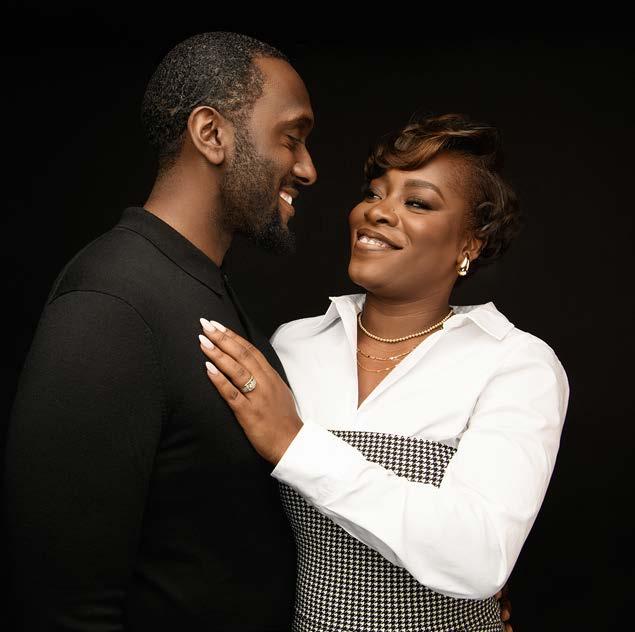
We are encouraged by the progress we made and lessons we learned in 2023. As we continue to refine our programming while staying true to our mission, we are beyond excited for what the future holds.
We have developed a Strategic Plan with a professional consulting group and have a clear vision for our dreams for the future and what it will take to achieve them. As we invest heavily in our AEOD programs (Fellows and Partner Sites), we are ready to take them to the next level and tap the unlimited potential of propagating our proven method of culturally-informed therapeutic mental health services and training the next generation of BIPOC therapists.
Our CEO and co-founder, Dr. Charles Daniels, Jr., will publish his long-awaited first book, PRESENT, in the summer of 2025, around the release of our 2024 Annual Report. Keep a lookout for promotion over the coming year and the opportunity to preorder this one-of-a-kind book that will no doubt contribute to the national narrative around the impacts of father presence.
Truly, we thank you from the bottom of our hearts for your support thus far. We’ve been in operation for over a dozen years and anticipate that the next dozen will impact exponentially more families on an even deeper level. Here’s to 2023’s successes (and lessons learned) and the future’s possibilities.


Dr. Charles Daniels and Samantha Fils-Daniels, Fathers’ UpLift Co-Founders
